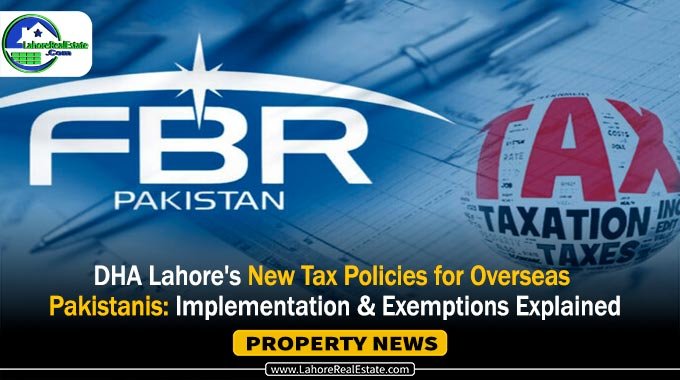DHA Lahore New Tax Policies for Overseas Pakistanis: Implementation and Explanation of Exemptions
In this blog, we explore DHA Lahore’s new tax policies for Overseas Pakistanis, including Section 236C, 236K, and Rule 7E exemptions. Learn the smooth process for non-residential verification and property transfer in Pakistan. These policies, including Sections 236C and 236K, and Rule 7E, have brought about significant changes in the procedure for taxation and transfer of property. This article provides a comprehensive explanation of these updates and provides insight into their implementation process.
Who qualifies as a non-resident?
Under Pakistani law, a non-resident is defined as a person who spends more than 180 days outside Pakistan in a calendar year. Non-residents are commonly referred to as “Overseas Pakistanis”. Their tax rates differ from those of resident Pakistanis, and the latest changes emphasize a streamlined process for verifying non-resident status.
Key updates to tax policies
1. Sections 236C and 236K
- 236C: Applicable to property sellers.
- 236K: Relevant for property buyers.
- Non-residents are charged at the filer tax rate (3%), exempting them from the higher non-filer tax rate.
Changes in Nonresident Status Determination:
Earlier, transfer authorities like DHA used to determine non-resident status by verifying an individual’s passport and travel history. However, K Federal Board of Revenue (FBR) Now it decides through its own systems.
Implementation:
- Generate a temporary PSID (Payment Slip ID) through FBR’s Iris system.
- Provide required documents:
- Passport copy
- Local Pakistani mobile number
- E-mail address
- Submit these details through your solicitor or vendor.
- FBR verifies non-resident status within 1-2 days, after which final PSID is issued.
- Pay tax based on filer rate (3%).
2. Rule 7E
Non-residents are exempted from Rule 7E. Transfer authorities no longer confirm exemptions. Instead FBR monitors this process.. The exemption ensures that transfers of property to non-residents avoid unnecessary complications.
Updated process for transfer:
- For purchases: Stamp paper permit should now be issued by a non-resident. This permit can be submitted digitally, eliminating the need for physical submission.
- For transfers: Vendors should include a clear statement on the stamp paper authorizing representatives to complete the transfer process on behalf of non-residents.
Easy procedure for overseas buyers
Earlier, a simple undertaking on stamp paper was enough to purchase property. Now, overseas buyers must issue a formal permit, which:
- Write the name of authorized representative clearly.
- Contains CNIC details.
- Confirms the buyer’s intention to transfer the property through a nominated person.
Digital submission methods such as email or WhatsApp are encouraged, ensuring faster processing times
The result
Updated tax policies and procedural changes for overseas Pakistanis are aimed at increasing transparency and efficiency in property transactions. By centralizing non-resident verification through the FBR and digitizing submission methods, these changes streamline the process while protecting the interests of overseas Pakistanis.




